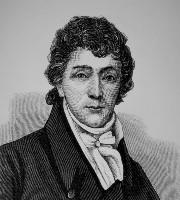About Francis Scott Key
Francis Scott Key (August 2, 1779 in Carroll City - January 11, 1843 in Baltimore) was an American poet, writer and jurist, famous for writing the national anthem of the United States, The Star-Spangled Banner. In the early 1810s, the United States was in conflict with Great Britain after the British kidnapped American sailors and following disputes in relations with France. The ensuing hostilities would come to be known as the War of 1812. Despite the fact that Key - as an Episcopalian - was opposed to war because of his religious beliefs and believed that disagreements could be settled without armed conflict, he served nevertheless in the field artillery.British forces captured Washington, DC, in 1814. A colleague of Key's, Dr. William Beanes, was taken prisoner. Thanks to his talent as a lawyer Key participated in the negotiation for the release of Beanes in Baltimore. British naval forces were along the Chesapeake Bay. With the help of Colonel John Skinner, Key secured Beanes' freedom after the British finished their bombardment of Fort McHenry.
On September 13, despite their continual bombardment the British failed to destroy the fort. The next morning at dawn Key wrote that a large American flag, sewn by Mary Young Pickersgill, was hoisted at the request of the fort commander.
The British ceased their attack and left the area. The next day, at an inn, Key completed his poem about the events he had witnessed. The poem was titled the Defense of Fort McHenry and was printed in tracts and newspapers, including the Baltimore Patriot. The poem was later set to music by John Stafford Smith. For Anacreon in the Sky became The Star-Spangled Banner. Under this name, the song was chosen as the national anthem of the United States, first by an executive order from President Woodrow Wilson in 1916 (which, however, had little practical effect, except requiring military bands to play it), then by a congressional resolution in 1931 countersigned by President Herbert Hoover.
In 1832 Key assumed the legal defense of Sam Houston in the trial in the House of Representatives which saw him accused of assaulting another congressman. In 1835 he prosecuted Richard Lawrence for his attempt to assassinate President Andrew Jackson. Key was a distant cousin of his namesake Francis Scott Fitzgerald, whose full name was actually Francis Scott Key Fitzgerald.
After falling ill with pleurisy, Key died at the age of 63 on January 11, 1843, in Baltimore, Maryland. "The Star-Spangled Banner" continued to be held as an American musical symbol despite criticism, due to some violent lyrics. He is buried at Mount Olivet Cemetery in Frederick, Maryland, next to Thomas Johnson, the first governor of Maryland, and Barbara Fritchie, who is said to have flown the American flag outside her home in defiance of the marching Stonewall troops Jackson through town during the American Civil War.
In 1970 Francis Scott Key was inducted into the Songwriters Hall of Fame.
Browse all poems and texts published on Francis Scott Key









